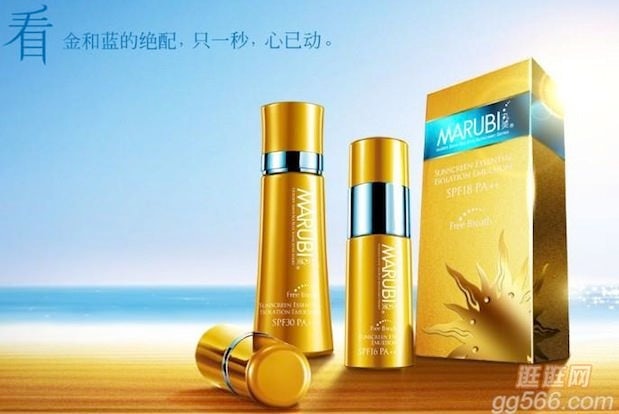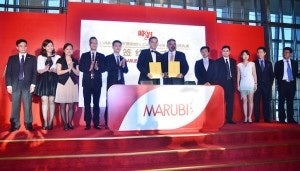
An ad for Chinese beauty brand Marubi.
After nearly three years of negotiations, LVMH-backed private equity fund L Capital Asia recently held a press conference at the Shanghai World Financial Center to announce its plan to invest in Chinese domestic cosmetics brand Marubi, which LVMH hopes to propel into the global spotlight with a possible Dior partnership and Sephora distribution. Not only would this produce major profits for the companies involved, but it may spark both the domestic and global rise of Chinese beauty brands as major competitors to U.S. and European market leaders.
According to the deal, the Singapore-based fund will officially become Marubi's second largest owner. The fund will initiate strategic cooperation with Marubi in product development, design, advertising, public relations, marketing, retail management, team building, global marketing, and M&A. Although the stake and the amount of the investment have not been disclosed, many industry insiders have speculated that the fund will hold 49 percent equity share of the cosmetics brand, with an investment of $100 million.
“L Capital Asia has been fully aware of Marubi's high-end positioning and steady growth, and we are very optimistic about the brand's development and growth in the near future,” said Ravi Thakran, managing partner of L Capita Asia and LVMH’s Southeast Asia and Middle East Group President. Sun Huaiqing, CEO of Marubi, said at the press conference, “We are very confident of Marubi's future, and our dream is to make it become a competitive world-class brand.” Sun also pointed out that the agreement will become an important milestone for Marubi's internationalization.

The ceremony announcing LVMH-backed L Capital Asia's investment in Marubi.
This dream may very likely become reality with Marubi's possible upcoming partnership with Dior and future place on the shelves of global beauty retail giant Sephora. According to the Chinese online financial news portal Yicai, Marubi will soon organize a tour for its marketing and R&D executives to visit French luxury house Dior, and the brand's new product designs will possibly be taken over by Dior's designers. In terms of sales channels, L Capital Asia will bring in Southeast Asian agents to market Marubi globally. According to Sun, Marubi's eye care product line has a good chance to enter the current mid-range sales channel vacancy of LVHM-owned Sephora, as there is no brand of its kind there already. The company seeks the acquisition of a leading cosmetic brand in Europe to make up its top-end vacancy in its brand portfolio, said Sun. Marubi's eye care line currently accounts for 30 percent of the brand's total sales, so being stocked at Sephora could spell out major profits for the brand.
According to the Chinese media, the fund conducted a fair amount of research of China's cosmetic sector before finally targeting Marubi. A Guangdong-based biotechnology company, Marubi's sales in 2012 reached 3 billion yuan (around $489 million). The company last year invested 100 million yuan in Guangzhou's Zhujiang New Town, aiming to build a new industrial park for developing technologies. As Thakran told the Chinese newspaper Moneyweek, the reasons for choosing Marubi over other Chinese cosmetics brands such as Jahwa included the company's high product quality, solid brand equity, and strong management team. The deal was brokered by HSBC executives, who introduced the two sides.
As the latest private equity fund sponsored by the LVMH Group, L Capital Asia recently raised $1 billion for its fifth fund, its second dedicated to investments in the Asia-Pacific region. The fund specializes in consumer product brands, lifestyle retail, lifestyle food and beverages, beauty and wellness, boutique hospitality, and media and entertainment. Since its inception three years ago, the fund had already forged a strategic investment partnership with four companies in Hong Kong and mainland China, including Emperor Watch & Jewellery, Ming Fung Jewellery, Jorya, and Ochirly.
In a recent Wall Street Journal interview, Thakran said the company will aim to spend between 45 percent to 60 percent of the new fund in China. He pointed out,
“Chinese entrepreneurs know their market and consumer better than anyone but they lack the knowledge of how to build brands. To them, our involvement resonates well as the capital injection is secondary while our ability to value-add is primary. We have the knowledge of how to improve products, design, merchandising, packaging, logistics, supply chain and, more crucially, the intangible piece of branding through marketing, advertising, customer-relationship management and public relations. They have a basic idea, and often have a local celebrity ambassador, but they realize our execution and finesse can make a significant difference. I believe the day Chinese entrepreneurs understand the complete brand-building process, they’ll be world conquerors.”
The Chinese cosmetics sector has been growing at a fast pace in recent years, but the market is currently dominated by foreign brands, such as L’Oreal and Estée Lauder. According to data compiled by the Hong Kong Trade Development Council (HKTDC), more than 4,000 enterprises in China are qualified to produce cosmetics, but domestic players only accounted for less than 20 percent of the market. Though a number of domestic cosmetics brands have started to quickly catch up with their international counterparts, either by revamping products or by rebranding, they still tend to target the mass domestic market more than the high-end. They typically have not even mentioned the global market, making LVMH's international aims with Marubi particularly significant.
These Chinese cosmetics brands have been seen as a big investment opportunity for global luxury giants like LVMH, who are eager to gain access to the Chinese mass market. Meanwhile, Chinese cosmetics brands have also caught the eye of China's first lady Peng Liyuan, who has given them a chance to revive themselves. During her foreign tour with President Xi Jinping to three African countries in March, Peng presented an assortment of products from the previously out-of-fashion beauty brand Pehchaolin as diplomatic gifts to African leaders' wives.
Thanks to both “The Peng Effect” and the endorsement of foreign luxury brands, the sales figures and influence of well-known Chinese cosmetics brands are likely to receive a boost both domestically and globally in the near future, and Marubi may only be the first of many Chinese cosmetics brands to grace Sephora's shelves.